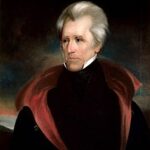President Andrew Jackson faced his greatest constitutional challenge in 1832. The Supreme Court ruled in Worcester v. Georgia that states could not regulate Cherokee territory. ⚠️ Jackson allegedly refused to enforce this landmark decision.
The Jackson Worcester Georgia Constitutional Crisis
Samuel Worcester, a missionary, challenged Georgia’s authority over Cherokee lands. The Supreme Court sided with Worcester in March 1832. Chief Justice John Marshall declared Georgia’s laws unconstitutional. The ruling protected Cherokee sovereignty and federal treaty rights.
Presidential Response to Court Ruling
Jackson reportedly said “John Marshall has made his decision; now let him enforce it.” This quote remains historically disputed. However, Jackson clearly refused to use federal troops against Georgia. 📊 The president prioritized state relations over judicial authority. His administration took no action to enforce the Court’s mandate.
Political Calculations Behind Defiance
Jackson faced intense political pressure from southern states. Georgia threatened nullification if the federal government intervened. The president needed southern support for his reelection campaign. 💰 Economic interests in Cherokee gold mines influenced his decision. Jackson chose political expediency over constitutional obligation.
Impact:
The Jackson Worcester Georgia crisis fundamentally altered American constitutional law. This precedent weakened judicial authority for decades. Future presidents cited Jackson’s defiance to justify their own constitutional violations.
Immediate Consequences for Cherokee Nation
🔥 The Cherokee people faced devastating consequences from federal inaction. Georgia immediately intensified pressure on tribal lands. State officials arrested Cherokee leaders and seized property. The ruling’s failure to be enforced accelerated Cherokee displacement. Within six years, the Trail of Tears forced thousands from their homeland.
Constitutional Precedent and Judicial Authority
Jackson’s defiance established dangerous precedent for executive power. Future presidents used this example to ignore court rulings. 📉 The Supreme Court’s authority declined significantly after 1832. Congress failed to impeach Jackson despite clear constitutional violations. This crisis demonstrated the weakness of judicial branch enforcement mechanisms.
Long-term Political Ramifications
The Worcester crisis accelerated sectional tensions over federal authority. Southern states gained confidence in defying federal mandates. 🌍 International observers questioned American constitutional stability. The decision contributed to the nullification crisis with South Carolina. Jackson’s selective enforcement of federal law undermined national unity and constitutional principles.
